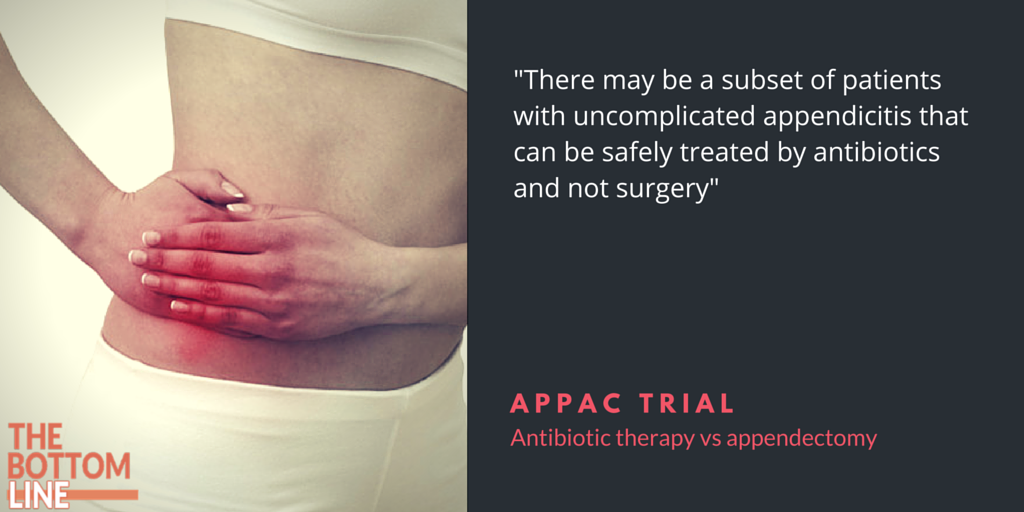APPAC
 Antibiotic therapy vs appendectomy for treatment of uncomplicated acute appendicitis
Antibiotic therapy vs appendectomy for treatment of uncomplicated acute appendicitis
Salminen. JAMA 2015; 313:2340-2348. doi:10.1001/jama.2015.6154
Clinical Question
- In patients presenting with acute uncomplicated appendicitis, is antibiotic therapy non-inferior to appendicectomy surgery?
Design
- Open-label randomised-controlled non-inferiority trial
- Two groups of patients in 1:1 ratio
- Randomised closed envelopes distributed to participating hospitals to indicate group (ie. no centralised patient group matching)
- Outcome adjudicators not blinded (assessed during hospital stay and afterwards by telephone interviews with patients)
- Study group largely separate to treating surgeons
- Sample size aim of 610 patients to provide 90% power to determine 75% success rate with antibiotics (based on previous similar studies), however terminated at 530 due to slow recruitment and expected power of 86% at this stage
Setting
- Six hospitals in Finland (three central, three university hospitals)
- November 2009 to June 2012
Population
- Inclusion criteria:
- Patients aged 18 to 60 years old with CT-confirmed uncomplicated appendicitis:
- Assessed by clinical history, examination, haemoglobin, leukocyte count, CRP, serum creatinine, serum HCG and urine dip. If suggestive at this stage consented for trial and CT performed.
- CT findings- appendix wall greater than 6mm with one of; abnormal contrast enhancement, inflammatory oedema, or fluid collection around appendix
- Patients aged 18 to 60 years old with CT-confirmed uncomplicated appendicitis:
- Exclusion criteria
- CT factors
- Appendicolith (predictive of failure of antibiotic therapy in Vons et al. 2011)
- Peri-appendicular abscess
- Perforation
- Suspicion of tumour or other diagnosis
- Patient factors
- Age < 18 or > 60
- Allergy to contrast
- Inability or refusal to consent
- Current use of metformin
- Peritonitis
- Pregnancy or breastfeeding
- Renal insufficiency with creatinine > 150 mol/l
- Serious systemic illness
- 1379 patients screened but only 530 randomised
- 351 had other finding on CT
- 337 had complicated appendicitis
- 116 refused to participate
- Remainder outside age range or other reasons for exclusion
- Over the study period 4380 appendectomies were performed at the trial hospitals- the trial represents a subgroup of about 30% of the total
- Although this does not appear to have been controlled for, patients were well-matched for sex, age, pain score, CRP level, haemoglobin, leukocyte count, creatinine and duration of symptoms
- CT factors
Intervention
- Antibiotic group
- 257 patients at randomisation
- Three day course of 1g ertapenem IV once daily with first dose given in emergency department
- Followed by seven days of oral antibiotics (levofloxacin 500mg once daily, metronidazole 500mg three times daily)
- Reassessed at 12 to 24 hours by on call surgeon
- If peritonitis, perforation or progressive infection suspected appendectomy performed
Control
- Surgical group
- 273 patients at randomisation
- Open appendicectomy by McBurney incision (trial protocol; however some cases performed laparoscopically)
- Single pre-operative dose of 1.5g cefuroxime and 500mg metronidazole
- Histopathological examination of appendix perfomed and positive diagnosis requires transmural neutrophil invasion with involvement of muscularis layer
- Following randomisation care provided by surgeons based on clinical experience rather than protocol
Outcome
- Primary outcome:
- Resolution of appendicitis without surgery during first admission
- 1/273 patients in surgery group had spontaneous resolution, and 2 did not have formal appendicitis on histological examination
- 242/257 (94%) in antibiotic group discharged without having appendicectomy
- 8 had appendicectomy of uncomplicated appendicitis
- 7 had appendicectomy of complicated appendicitis
- No recurrent appendicitis during following year
- 55/242 (23%) patients in antibiotic group returned within one year and underwent surgical treatment for recurrent appendicitis
- 50 of these had uncomplicated appendicitis and 5 had a normal appendix removed
- Median interval for recurrence was 102 days
- Therefore 72.7% did not require appendicectomy either in during the index hospital admission or during the one-year follow-up period, and were treated successfully with antibiotics alone (during the follow-up period)
- This was more than the pre-trial expectation of 24% failure with antibiotic therapy to determine non-inferiority to surgery
- 55/242 (23%) patients in antibiotic group returned within one year and underwent surgical treatment for recurrent appendicitis
- Resolution of appendicitis without surgery during first admission
- Secondary outcome:
- Duration of hospital stay
- 3 days in both groups
- Pain scores and use of analgesia
- Slightly reduced pain in antibiotic group at discharge (2/10 rather than 3/10 on visual analogue score) and at one week (1/10 rather than 2/10) but same score at two months
- Use of analgesia not reported
- Post-intervention complications
- 24 surgical site infections in surgical group (8.8% operated)
- 1 surgical site infection in antibiotic group (1.4% operated)
- 2 incisional hernias in surgical group (none in antibiotic group); one of these repaired
- 23 patients in surgical group had other symptoms potentially related to adhesions, such as disturbance of eating and bowel function or abdominal pain. This compared to 4 with similar symptoms in the antibiotic group
- Sick leave
- 19 days median sick leave in surgical group compared to 7 in antibiotic group
- Duration of hospital stay
- Other outcomes
- Four patients in surgical group had incidental appendiceal tumours found on histology
- 6% of surgical group concerned about scar appearance at one year
- Planned outcomes (not yet reported)
- Follow-up at 3, 5, 10 years for recurrent appendicitis, caecal or appendiceal cancer, or incision hernias
- Cost analysis planned but unreported
Authors’ Conclusions
- Most patients with uncomplicated appendicitis on CT were treated adequately with antibiotics during their first admission and did not require appendicectomy during the following year
- There did not appear to be significant complications if appendicectomy was later required
- However antibiotics did not meet the prespecified criterion for noninferiority compared to surgery
Strengths
- External Validity – compared to previous work:
- Larger study
- Did not appear to exclude patients with co-morbidities other than renal failure or use of metformin (however young population)
- Narrower definition of uncomplicated appendicitis
- Included female patients
- Different antibiotic choice which may give better coverage of intra-abdominal infection
- Internal Validity – appropriate methodology:
- Succeeded in randomising a large number of patients to provide an adequately powered study, especially given that most clinical (and public) viewpoints consider appendicectomy to be the definitive treatment for appendicitis
- Statistical methods are valid
- Relatively low drop-out rate to one year
- CT diagnosis allows retrospective analysis
- Clinical Relevance – chosen outcomes are clinically important
- Although lack of blinding appears at many levels – it may have been more difficult for the non-surgical group to get sick leave from their employer
Weaknesses
- Ethics:
- Some concern that this trial may have been unethical due to the strength of feeling on surgery as the appropriate management for appendicitis; however given previous similar studies I think this trial was reasonable
- Statistical Methods:
- The expected non-inferiority margin of 24% was optimistic compared to previous reviews (Cochrane review average 26.6%, 95% confidence intervals 18-37%), and together with halting the trial early, statistical proof of non-inferiority was unlikely.
- Non-inferiority methodology does not completely consider the multiple factors involved, such as cost, patient expectation and experience, and resource use
- External Validity:
- Single country so potentially different microbiome
- High rate of exclusion from trial
- Open appendicectomy was the procedure of choice; although the paper states that some were performed laparoscopically (standard of care in many countries) no breakdown is given and this may have reduced the (relatively high) complication rate in the surgical group
- Internal Validity:
- Telephone interviews probably not ideal to diagnose surgical complications such as those potentially related to adhesions
- Drop out rate is high enough to potentially alter the results
- No reported feedback from the patients who developed recurrent appendicitis and needed a later operation – this is important in a litigation-friendly environment
- Surgeons used their own clinical experience in deciding treatment after randomization- as an antibiotic course would be unfamiliar to them this would potentially increase the cross-over rate to surgery
- Clinical Relevance:
- Advocating greater use of antibiotics is not good antibiotic stewardship and resistance may result
- Recurrent appendicitis and subsequent appendicectomy occurred within a median of 102 days (IQR 43 – 204 days) for 1 in 5 patients – it is unclear from this study whether patients treated with antibiotics alone will go on to develop increasing frequency of appendicitis or complications; do antibiotics truly treat appendicitis or just delay surgery?
The Bottom Line
- There may be a subset of patients with uncomplicated appendicitis that can be safely treated by antibiotics and not surgery
- This trial is based on a different treatment paradigm to the UK; here diagnostic laparoscopy is more common (as is ultrasound) and the risk of removing a normal appendix is accepted
- Overall I would not use this paper alone to change practice in this country, but it could be useful in other countries, where the diagnostic process is different
External Links
- [article] Antibiotic Therapy vs Appendectomy for Treatment of Uncomplicated Acute Appendicitis
- [further reading] The case of the non-inferior inferiority by EMNerd
- [further reading] Research and Reviews 90 by LITFL
- [further reading] The era of the appendectomy is not over by EMlitofnote
- [further reading] Emergency surgery commissioning guide by ASGBI
- [further reading] An interesting possible alternative treatment method may be endoscopic washout
Metadata
Summary author: John Kiely
Summary date: 10 January 2016
Peer-review editor: @DuncanChambler




how does this treatment compare to that of dr. marik?
Thanks for the comment, but I’m not sure I understand the question. Do you mean, how does antibiotics vs surgery compare to Dr Marik’s high dose vitamin regime? I don’t think I’ll be advocating treating appendicitis with vitamins, but perhaps I’ve misunderstood you. Please elaborate if you’d like.